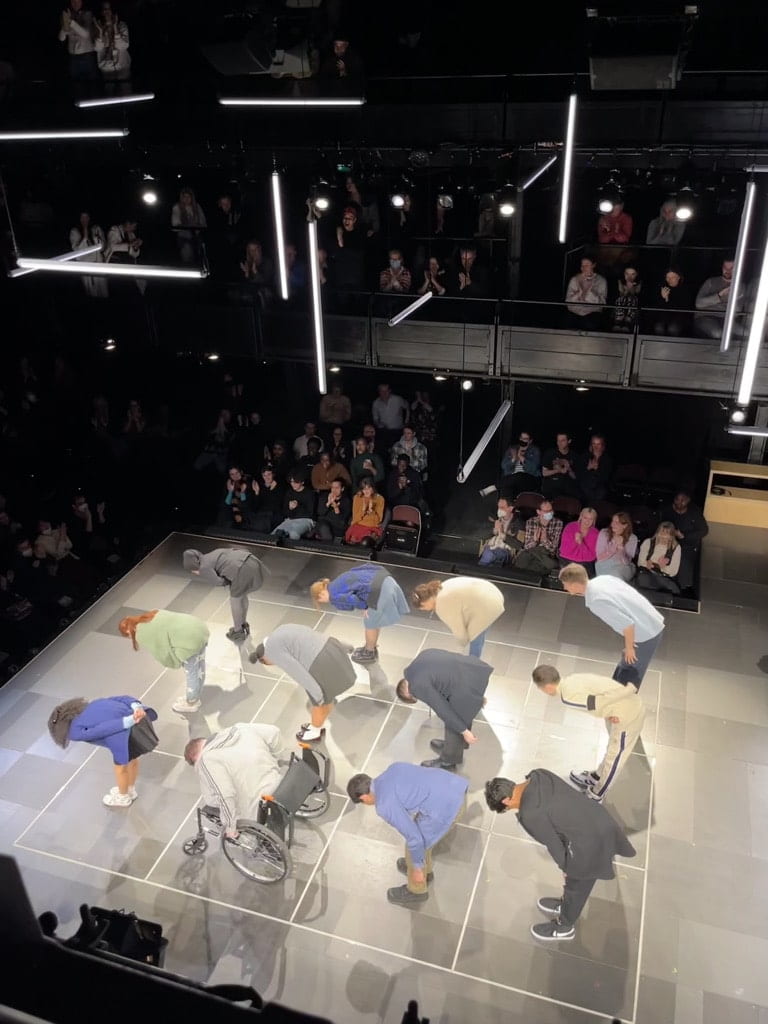“Our” Generation
Hope Fowler
Including everyone in understanding what it means to grow up in the 21st century

The play “Our Generation”, written by Alecky Blythe, is a commentary on the lives of Generation Z, the teenagers of today. Focusing on the struggles and strengths of growing up in our modern world, the play is an expression of hope, perseverance and friendship.
Going into this play, I was admittedly skeptical. Plays about teenagers often have a patronizing air and are filled with stereotypes, leaving me to wonder if the playwright knew anything about teenagers at all. Blythe, in order to get ahead of this issue, interviewed many teenagers over many years, allowing her to understand the voice and mind of young people. There was an easy flow to dialogue, each character felt unique in their voice and story, and even the adults did not all follow the stereotype of the overprotective or confused parent. The difficulty in titling a play “Our Generation” is that it includes the audience, and yet this play included many into its themes. In discussing issues of body image, race, class, and the difficulty of finding yourself, everyone was able to relate in some way, even if the characters discussing these ideas were significantly younger.
The timeline of the play was also interesting and gave a unique feel, as it followed about 12 teenagers as they grew from ages 13-15 to 18-20. We got to learn about their dreams, their fears and their personal struggles through soliloquies and monologues. Setting a play over such an expansive period is a difficult thing to do, and yet Blythe conquers it masterfully, convincing the audience that they are watching characters grow up in front of their eyes. Each teenager feels real, and while some are more memorable than others depending on who you may relate to more, all of them are beautifully created.
While the individuals and the writing were incredible, one of my favorite parts was the staging of this play. Between monologues and group conversations were dance breaks, concerts and music that provided a much-needed break between all the information given. The play is almost 4 hours long, and it is a struggle to hold an audience for that long. The songs and dances were energetic, pure entertainment that were meant to be flashy, and they accomplished exactly that. They fit into the storyline as school dances yet also broke from the constant talking and allowed audiences to enjoy a spectacle.
This play also did something many aren’t doing- discussed and incorporated the pandemic into the show. While many plays contain themes of lockdown such as grief, loneliness or rediscovery, this play addresses it head on. Each teenager loses something, a dream, a trip or a job due to the pandemic, and it is interesting to see people acting out what we are still living through. Watching people your own age discuss the sense of loneliness and boredom that came with lockdown was very startling, and yet unifying at the same time.
The idea of “Our Generation” is a very intriguing one- what does it truly mean to be a part of this generation, to be growing up in such a controversial and difficult world? Although there is no way to truly answer this complex question, we can acknowledge that this play is an homage to the importance of understanding. Although Blythe is not a part of the generation, she wanted to understand the complexities of it rather than accepting the stereotypes assigned to it. This lesson is applicable to all aspects of life, whether it is understanding other generations, cultures, ideologies, or identities. This play was energetic, interesting, and well worth the four hours.





